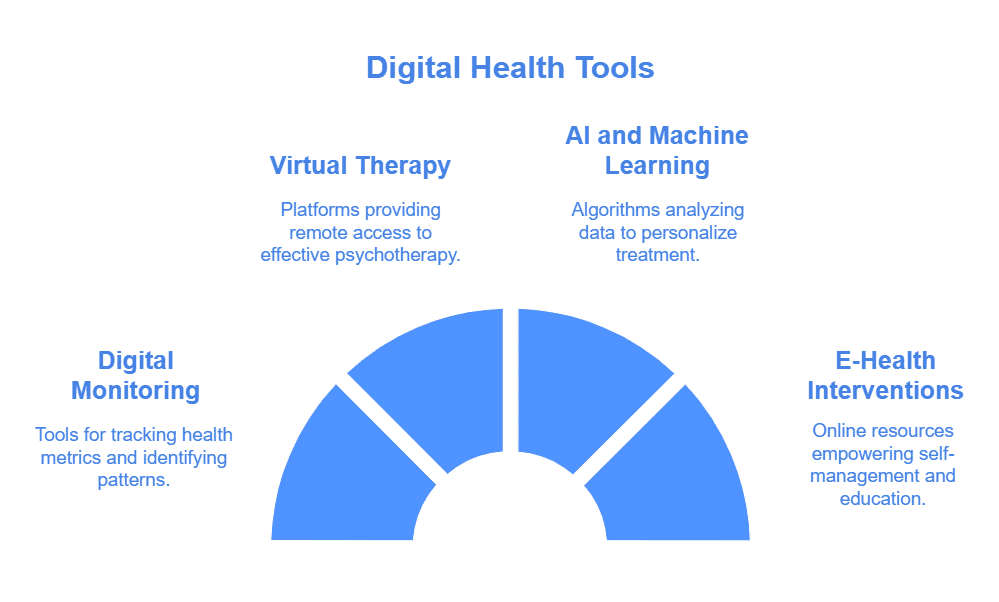Bipolar disorder is a complex mental health condition characterized by alternating episodes of mania and depression. While significant progress has been made in understanding and treating the disorder, ongoing research continues to uncover new insights and approaches. These innovations promise more effective, personalized, and accessible treatments for individuals living with bipolar disorder.
Advances in Pharmacotherapy
1. Optimizing Current Medications:
Mood stabilizers like lithium and antipsychotics such as quetiapine remain foundational treatments for bipolar disorder. However, ongoing research focuses on optimizing these medications to:
- Reduce side effects, such as weight gain and sedation, often associated with long-term use.
- Improve efficacy in preventing relapses of both manic and depressive episodes.
2. New Drug Development:
- Novel Mood Stabilizers: Researchers are exploring compounds that target specific neurotransmitter pathways, such as glutamate, to stabilize mood with fewer adverse effects.
- Antidepressant-Augmenting Agents: Given the risk of triggering mania, traditional antidepressants are often avoided in bipolar disorder. New drugs aim to manage depressive symptoms without destabilizing mood.
- Rapid-Acting Treatments: Ketamine and its derivative esketamine show promise for rapidly alleviating severe depressive symptoms in treatment-resistant bipolar disorder.
3. Emerging Therapeutics:
- Neuroprotective Agents: Drugs like N-acetylcysteine (NAC) and omega-3 fatty acids are being studied for their ability to reduce inflammation and oxidative stress, both of which are implicated in bipolar disorder.
- Targeting Circadian Rhythms: Medications that regulate the body’s internal clock are under development, given the significant role circadian dysregulation plays in mood episodes.
The Role of Digital Health Tools

1. Digital Monitoring and Diagnosis:
- Smartphone Apps: Mobile applications can track mood, sleep, activity levels, and medication adherence in real-time, helping individuals and clinicians identify patterns and triggers.
- Wearable Devices: Tools like fitness trackers and smartwatches provide continuous monitoring of physiological markers, such as heart rate variability, that may predict mood changes.
2. Virtual Therapy Platforms:
- Telehealth services have expanded access to psychotherapy for individuals in remote or underserved areas. Evidence suggests that virtual Cognitive Behavioral Therapy (CBT) and Interpersonal and Social Rhythm Therapy (IPSRT) are as effective as in-person sessions.
3. Artificial Intelligence (AI) and Machine Learning:
- AI-powered algorithms analyze large datasets to predict mood episodes or recommend tailored treatment strategies. These tools can personalize care by integrating data from electronic health records, wearable devices, and self-reported symptoms.
4. E-Health Interventions:
- Online self-management tools and psychoeducation platforms empower individuals to take an active role in managing their condition. Resources include interactive mood charts, guided mindfulness exercises, and peer-support forums.
Personalized Medicine and Biomarkers
1. The Promise of Personalized Medicine:
Traditional treatments for bipolar disorder often follow a trial-and-error approach, leading to delays in achieving symptom control. Personalized medicine aims to tailor treatments to the individual’s unique genetic, biological, and environmental profile.
2. Identifying Biomarkers:
- Genetic Markers: Studies are identifying specific genes associated with susceptibility to bipolar disorder. These markers could guide the selection of medications that align with an individual’s genetic profile.
- Neuroimaging Biomarkers: Advanced imaging techniques, such as functional MRI, reveal structural and functional brain changes associated with bipolar disorder. These findings may help predict treatment response.
- Blood-Based Biomarkers: Researchers are exploring inflammatory markers, cortisol levels, and neurotransmitter metabolites as potential indicators of mood episode onset or treatment efficacy.
3. Tailored Treatment Approaches:
- Predicting which medications are most likely to be effective based on genetic or biomarker data.
- Monitoring treatment response in real-time through physiological markers, enabling timely adjustments to therapy.
4. Pharmacogenomics:
- This emerging field focuses on how an individual’s genetic makeup influences their response to medications. For example, variations in genes affecting drug metabolism can guide dosing decisions, reducing the risk of side effects or treatment failure.
Global Perspectives on Bipolar Disorder
1. Cultural Differences in Diagnosis and Treatment:
- In some cultures, symptoms of bipolar disorder may be misinterpreted due to varying beliefs about mental health. For example, manic episodes may be viewed as spiritual experiences, delaying diagnosis and treatment.
- Culturally sensitive diagnostic tools and treatment strategies are essential for effective care worldwide.
2. Addressing Disparities in Care:
- Access to mental health services remains a challenge in low- and middle-income countries. Innovative solutions, such as mobile health clinics and telepsychiatry, are bridging this gap.
- Advocacy efforts focus on reducing stigma in regions where mental health disorders are heavily stigmatized, preventing individuals from seeking care.
3. Collaborative Research Efforts:
- Global initiatives like the World Health Organization’s Mental Health Gap Action Programme (mhGAP) aim to improve access to evidence-based care for bipolar disorder and other mental illnesses.
- Cross-cultural research studies help identify universal and culturally specific factors influencing the course and treatment of bipolar disorder.
4. The Role of Policy:
- Governments play a crucial role in improving mental health care infrastructure. Policies promoting mental health education, funding for research, and insurance coverage for bipolar disorder treatment are essential steps toward equitable care.
The future of bipolar disorder treatment lies in innovation and personalization. Advances in pharmacotherapy promise more effective and tolerable medications, while digital health tools enhance monitoring, diagnosis, and access to care. Personalized medicine, guided by biomarkers and pharmacogenomics, is revolutionizing the approach to treatment, ensuring that interventions are tailored to individual needs. Finally, addressing global disparities in care and fostering cross-cultural understanding will pave the way for a more inclusive approach to managing bipolar disorder. Together, these advancements offer hope for a future where individuals with bipolar disorder can achieve better outcomes and lead fulfilling lives. To ensure these advancements are embraced and accessible, reducing public misconceptions remains vital—particularly through efforts aimed at breaking the stigma around bipolar disorder.





